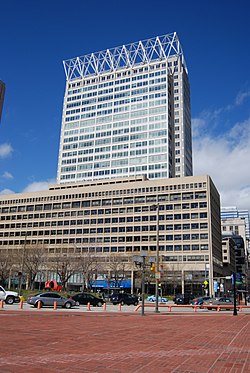1937–1986
Thomas Rowe Price, Jr. founded T. Rowe Price & Associates in Baltimore in 1937. The firm was originally headquartered at 10 Light Street and staffed by a small pool of associates, many of whom left Legg Mason's precursor, MacKubin, Legg and Co., along with Price. [12] Initially a very small firm focused on wealth management, and private investment accounts for Baltimore-area families, the company struggled during the Great Depression and World War II before gaining solid footing at the end of the 1940s. By 1950, its clientele grew too large for the staff to manage accounts individually, so the firm incorporated and launched its first mutual fund, the T. Rowe Price Growth Stock Fund. [9] [13]
Gaining traction in Baltimore and along the U.S. eastern seaboard, the firm continued a steady expansion of clientele, staff, and geographic reach. By 1960, Price opened a second fund, named the New Horizons Fund, focused on growth investment opportunities, and especially technology firms like Xerox, IBM, and Boeing. [13] In need of more room, the headquarters were moved in 1962 to the new One Charles Center building designed by Ludwig Mies van der Rohe nearby in downtown Baltimore. [14] At the same time, Price began to prepare for retirement, resigning as president of the firm in 1963, delegating some responsibilities, and selling his shares in the company. [13] Despite this, Price maintained an active presence in the firm for several years and urged the opening of the New Era Fund in 1969 as a response to the rapid inflation he predicted would dominate the 1970s. [15] In 1971, the year Price completely retired, T. Rowe Price opened its Fixed Income Division, and began to modernize and diversify its operations.
In the 1970s and early 1980s, T. Rowe Price kicked off more assertive growth than before, moving to its current location at 100 East Pratt Street and opening its first international office. In 1979, T. Rowe Price launched a joint venture with British asset manager Robert Fleming & Co. named Rowe Price-Fleming International. The venture, which managed $39 billion at its height in 2000, allowed T. Rowe Price to offer a broader range of services and expertise internationally. [16]
1986–2010
T. Rowe Price held its initial public offering, valued at nearly $200 million, in 1986. [17] Shortly thereafter, the firm began establishing larger office complexes in the U.S. and research offices around the world, beginning with a Hong Kong office in 1987. Retirement Plan Services were launched in the 1990s alongside additional new services and funds, including mutual funds acquired from other companies such as USF&G. [18] This momentum, and the firm reaching $100 billion assets under management, pushed T. Rowe Price to create an asset management partnership with Sumitomo Bank and Daiwa Securities in Tokyo in 1999, and to purchase 100% interest of the London-based Rowe Price-Fleming International, which was renamed T. Rowe Price International. [13] Also in 1999, T. Rowe Price was added to the S&P 500 Index. [19] [20]
T. Rowe Price largely avoided the dot-com bubble of 2000. [21] The Wall Street Journal expressed surprise at the firm's moderation with avoiding concentrated holdings in trendy internet technology stocks, in an article published a week before the markets began to crash in March 2000. [22]
In 2001, the company launched T. Rowe Price Funds SICAV, domiciled in Luxembourg, for non-U.S. institutional investors and financial intermediaries. Two years later it created target-date retirement funds. [23] In 2010, T. Rowe Price bought a significant interest in Unit Trust of India, India's oldest mutual fund company and one of its five largest. [24] Since 2000, T. Rowe Price has opened global offices in locations ranging from Madrid and Dubai to Stockholm and Sydney. [25]


